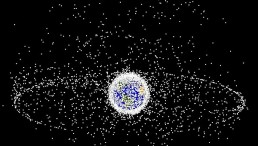Martyn Poliakoff of the University of Nottingham took home the Guinness World Record for the world's smallest periodic table in 2010. The tiny periodic table was etched onto one of the chemist's own hair. The table of elements only measured 90µm by 46µm.
Nine years later, the University of Nottingham has beaten their own record when they engraved an even tinier periodic table on a silicon chip, using the method of electron beam lithography or EBL.
As an added bonus, the silicon chip was not just engraved with the world's smallest periodic table, it was also engraved with two microscopic portraits! The periodic table, being six times smaller than the university's previous record, measures only 14µm by 7µm. The two portraits, of Dimitri Mendeleev and Yuri Oganessian, alongside the table, were 30μm by 30μm each. The portraits are said to be smaller than a fiber of wool.
Mendeleev is a Russian chemist and inventor known for creating the periodic table of chemical elements. Oganessian, on the other hand, is a Russian nuclear physicist who co-discovered the heaviest element in the periodic table, number 118, oganesson. The non-metal element named after the physicist is a synthetic chemical element discovered on October 16, 2006.
The intricate work was done by Richard Cousins, an EBL technician at Nottingham. To carve out a pattern in a polymer film, Cousins used a beam of high energy electrons measuring only a few nanometers in diameter to make a resist. After that, radioactive ion etching is used to transfer the 3D pattern onto the silicon. Cousins finished the etching by using thermal evaporation to deposit a thin layer of gold into the chip where it will stick on areas etched by the EBL. Excess material was washed off using a solvent and the desired patterns, a periodic table, and two portraits, were left.
The United Nations Educational, Scientific and Cultural Organization, UNESCO, has declared 2019 to be the International Year of the Periodic Table of Chemical Elements. Oganessian gave a keynote lecture on March 13, 2019, at the University of Nottingham as part of the year-long celebrations. UNESCO intends to emphasize the importance of the periodic table and its recognition as one of the most prominent achievements in science.
The timing of setting a new world record, and the speech held by Oganessian for the UNESCO-declared celebration, all came together as March 2019 marks the 150th year anniversary when Mendeleev established the periodic table.














